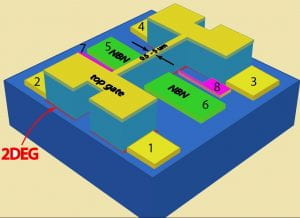The development of topological quantum matters ignites tremendous interests in novel topological excitations such as Majorana Fermions (MFs). MFs, which are their own antiparticles, are topologically protected non-Abelian excitations that can be utilized for establishing the building blocks for fault-tolerant quantum computing. The search for MFs, or rather the Majorana zero modes (MZMs), have brought renewed interests in superconductor-semiconductor hybrid systems, especially the planar Josephson junctions. Promixitized superconductivity (SC) in the presence of SOC can support a topological superconducting phase (TSC). Nevertheless, most experiments concern weakly interacting systems where electron correlation is unimportant. On the other hand, strong interaction could modify the picture and more exotic excitations such as fractional MFs known as the parafermions and the Fibonacci phase may emerge (i.e. in edge states of the FQHE). Our work aims at nonconventional SC proximitized in strongly interacting systems and explores possible topological phase transitions and MZMs in the presence of strong intrinsic SOC and ferromagnetic exchange interaction.

